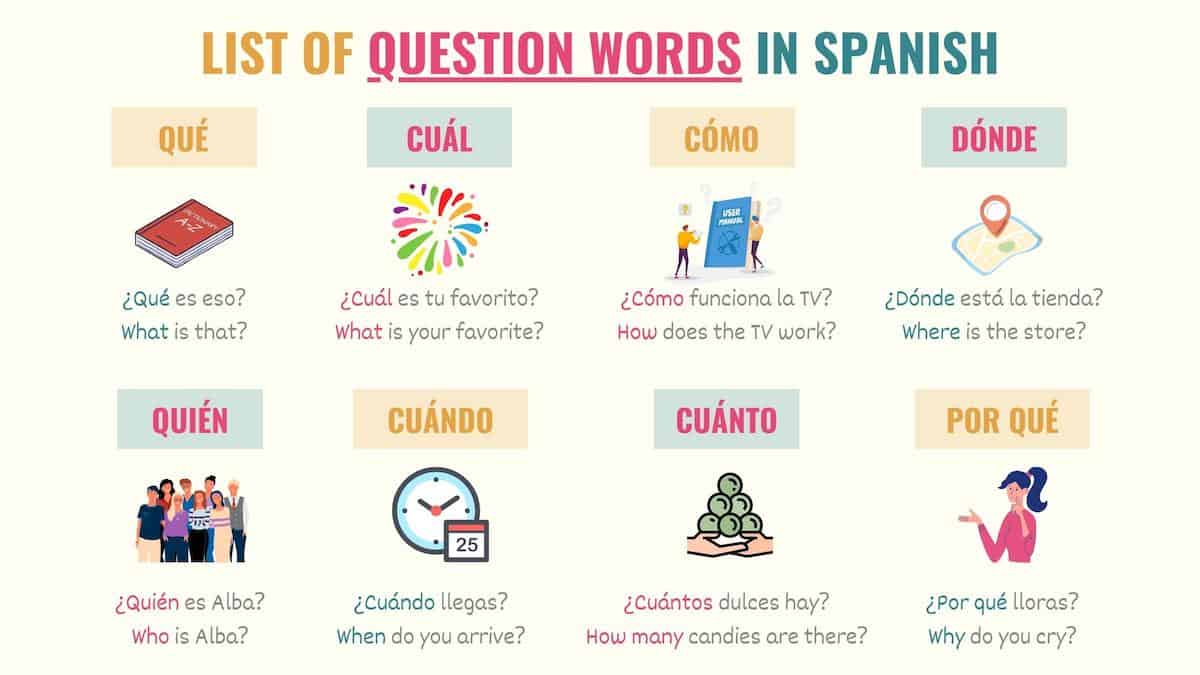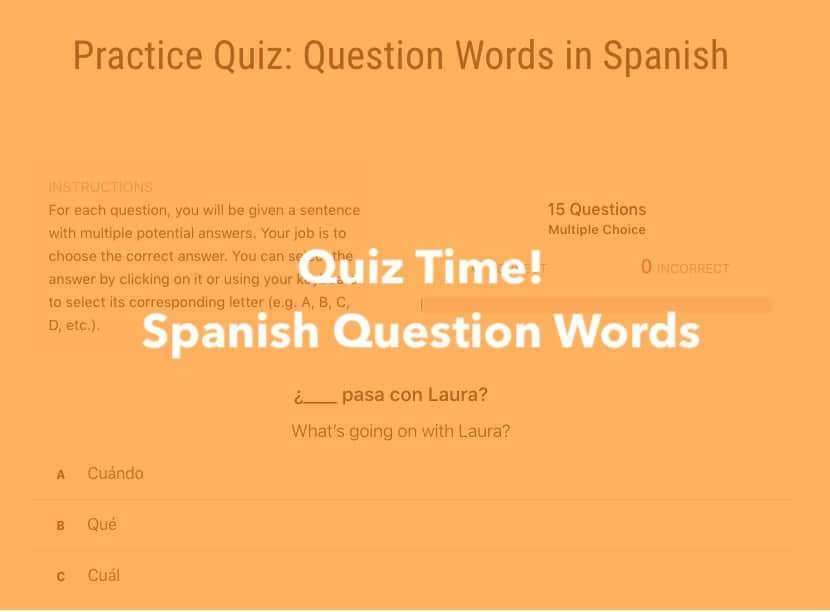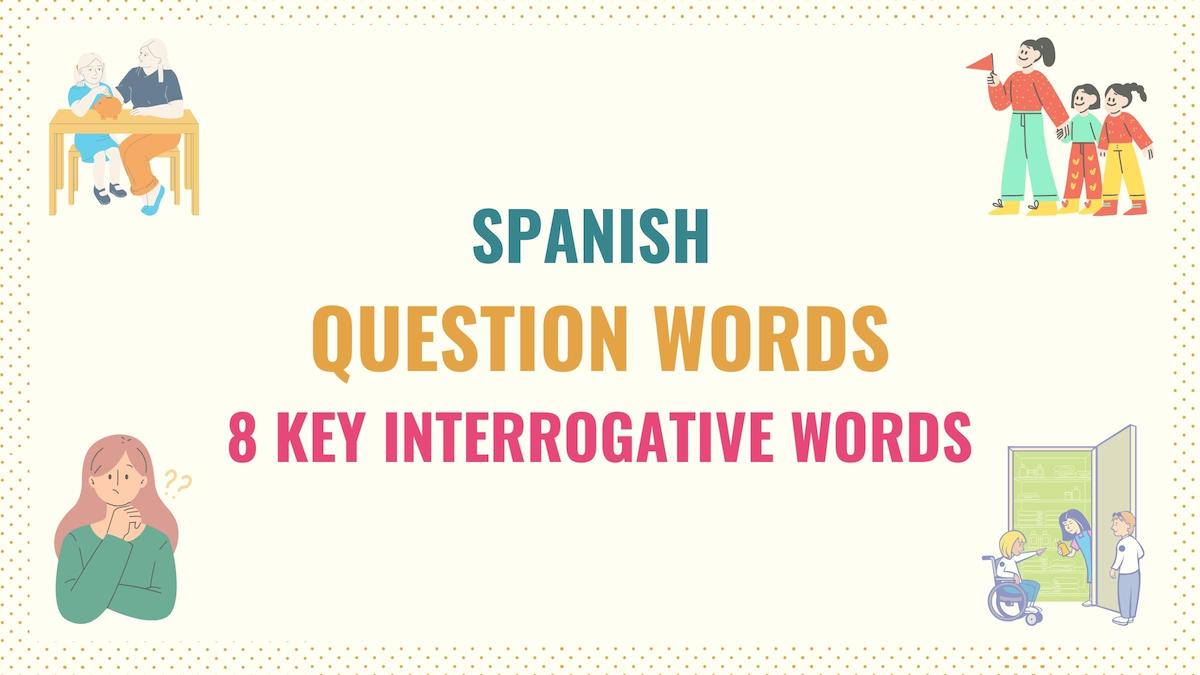Question words in Spanish, also known as interrogatives, are used to ask questions. Their primary purpose is to require information that cannot be answered with a simple yes or no.
In short, interrogative words in Spanish are fundamental to asking questions. For that reason, in this article, you’ll learn everything there is to know about question words. The topics we will cover include:
Let’s do this!
List of All Spanish Question Words
Below, you’ll find a list of Spanish question words. Since there are some nuances, variations, and rules you need to consider, make sure you read the descriptions and examples carefully.
¿Qué? – What?

In Spanish, ¿qué? is used to ask for time, facts, definitions, explanations, and things. As a result, qué works with Spanish nouns and verbs.
¿Qué + [noun/conjugated verb]?
¿Qué tipo de comida te gusta?
What type of food do you like?
Disculpe, ¿qué hora es?
Excuse me, what time is it?
¿Qué es el pretérito?
What is the preterite?
Take Note: In English, many questions regarding personal information are posed with the interrogative ‘what’. However, we use the question word cuál in Spanish for this context.
¿Cuándo? – When?

To ask about when an action is taking place, we use the interrogative word ¿cuándo?
¿Cuándo + [conjugated verb]?
¿Cuándo cumples años?
When is your birthday?
¿Cuándo vamos a ir al cine?
When are we going to the movies?
¿Cuál? – What? / Which?

In Spanish, ¿cuál? is used to ask about personal information and preference. In other words, when referring to objects or preferences, ‘¿cuál?’ forces you to choose between different options of a group or category. Therefore, it can be translated as what or which.
¿Cuál + [noun/conjugated verb] + [complement]?
¿Cuál es tu número de teléfono?
What is your phone number?
¿Cuál camisa te gusta más?
Which shirt do you like the most?
Cuáles is the plural form of ‘cuál’ and it should be used when working with a plural noun. For instance:
¿Cuáles son tus películas favoritas?
What are your favorite movies?
Take Note: Because they share the same translation, qué and cuál are easily confused. My article qué vs cuál can help you understand these words’ differences. Also, when asking about personal information in the past, the verb that follows cuál should be conjugated in the imperfect tense.
¿Dónde? – Where?

The Spanish question word ¿dónde? allows you to inquire about location and places.
¿Dónde + [conjugated verb] + [determiner] + [noun]?
¿Dónde dejaste mis llaves?
Where did you leave my keys?
Disculpe, ¿dónde queda el museo?
Excuse me, where is the museum?
Tip: Whether you’re a beginner or learning Spanish for traveling, you must get familiar with this question word since it’ll allow you to ask for directions.
¿Quién? – Who?

We use ¿quién? to ask about people. If you’re asking about a group of people, you must use its plural form ¿quiénes?
¿Quién + [conjugated verb]?
¿Quiénes son ellos?
Who are they?
Niños, ¿quién rompió mi taza?
Kids, who broke my cup?
¿Cómo? – How?

When asking a question about the manner or way something happens, in Spanish, we use the question word ‘cómo’ (how). However, this term can be translated as ‘what’ when asking for someone’s name.
If you’re learning Spanish, ‘¿cómo?’ allows you to ask questions related to pronunciation and vocabulary. Notice that a conjugated verb always follows this word.
¿Cómo + [conjugated verb]?
¿Cómo has estado?
How have you been?
Hola, ¿cómo te llamas?
Hi, what’s your name?
Oye, ¿cómo se dice ‘te amo’ en español?
Hey, how do you say ‘I love you’ in Spanish?
Tip: In Spanish conversations, ¿cómo? is used as a polite way to ask people to repeat something you didn’t hear. In this context, it also means ‘what’. Using ‘¿qué?’ in this situation can be considered discourteous.
¿Cuánto? – How much? / How many?

Cuánto is an adjective of quantity. So, as a question word in Spanish, ¿cuánto? seeks information about amounts. These amounts can refer to time, age, measures, prices, etc.
Since it’s an adjective, ‘¿cuánto?’ has plural and feminine forms. So, depending on the gender of the noun, you’ll use one of the following question words:
- ¿Cuánto? / ¿Cuánta?: How much?
- ¿Cuántos? / ¿Cuántas?: How many?
¿Cuánto + [noun] + [verb conjugated]
¿Cuánta leche necesitamos?
How much milk do we need?
¿Cuántos días necesitas?
How many days do you need?
Take Note: Although it’s the direct translation of ‘how much’ and ‘how many’, the translation of ‘cuánto’ can vary depending on the information you’re requesting:
¿Cuántos años tienes?
How old are you?
¿Cuánto mide tu hermana?
How tall is your sister?
¿Por qué? – Why?

¿Por qué? is used to ask about the motive or reason for an action. This question word is immediately followed by a verb or a noun.
¿Por qué + [noun / conjugated verb] + [complement]?
¿Por qué lloras? ¿Estás bien?
Why are you crying? Are you okay?
¿Por qué estás enojada conmigo?
Why are you mad at me?
¿Por qué los interrogativos en español llevan acento?
Why do question words in Spanish have an accent?
Take Note: Do not confuse por qué with porque and porqué. ‘Porque’ (a single term without an accent mark) is ‘because’, and it answers a question or states the reason for something. ‘Porqué’ is a noun and it means ‘reason’ or ‘cause’. It’s usually applied in formal contexts.
No puedo ir porque estoy ocupada.
I can’t go because I’m busy.
Desconozco el porqué de esta decisión.
I do not know the reason for this decision.
Bonus: Question Words and Spanish Prepositions
So far, you’ve learned basic common question words. These interrogatives can be combined with a preposition to ask for more specific information. So, make sure you understand them.
Below is a table with some question words with prepositions. Keep in mind that using prepositions will add some nuance in meaning to the question you’re asking.
| Question | English | Asks about |
|---|---|---|
| ¿Para qué? | What for? | The purpose of an action. |
| ¿Desde cuándo? | Since when | The beginning of an action. |
| ¿Para cuándo? | When…for? | Deadlines. |
| ¿Hasta cuándo? | For how long… / Until when… | The end of an action. |
| ¿A dónde? | Where / Where…to? | Someone’s direction or destination. |
| ¿De dónde? | Where…from? | Origin. |
| ¿En dónde? | Where? | Location. It adds emphasis. |
| ¿Por dónde? | Where? | Whereabouts and general directions. |
| ¿A quién? | Who / To whom? | The person who is receiving something. |
| ¿Con quién? | Who…with? / With whom? | Company or the person you’re interacting with. |
| ¿De quién? | Whose? | Possession. |
| ¿Para quién? | Who…for / For whom? | The recipient of something. |
¿A dónde fueron?
Where did you guys go?
¿De dónde eres?
Where are you from?
¿Para cuándo es la tarea?
When is the homework for?
Unlike English, in Spanish, a preposition used with a question word cannot be placed at the end of the sentence.
Key Points & Spanish Grammar Rules about Question Words

Interrogative words are key to asking many basic and more complex questions. Here are some Spanish grammar rules and key points that you should keep in mind when using question words:
- In Spanish, question words always have an accent mark on one of their vowels.
- The accent mark distinguishes question words from other terms, such as conjunctions, relative pronouns, adverbs, and adjectives.
- Questions in Spanish are surrounded by two question marks.
- To form a question in Spanish, you do not need an auxiliary verb, and you can omit the subject pronoun.
- Questions about personal information use ‘cuál’ instead of ‘qué’ to say ‘what’.
- When asking for someone’s name in Spanish, you must use ‘¿cómo?’.
- Spanish interrogative words followed by prepositions seek more specific information.
Download the Spanish Question Words PDF
Please feel free to download the graphics, tables, key points, and other notes on using question words to study later! It includes all of the question words (qué, dónde, cómo, cuál, etc.) as well as their variations and examples for you to practice with.
Watch the Video Lesson
Watch the Spanish Immersion Lesson!
At Tell Me In Spanish, I record all my lessons in English and Spanish immersion, so that you can learn no matter your comprehension level. You can watch the immersion version of this question words lesson if you’re ready to challenge yourself.
Practice Quiz: Question Words in Spanish
You can take this quiz if you want to practice Spanish question words. In this quiz, you’ll be presented a question sentence in Spanish and English with a blank for the question word. Your job is to choose the correct word (e.g. por qué, cómo, dónde, etc.) to complete the question.




